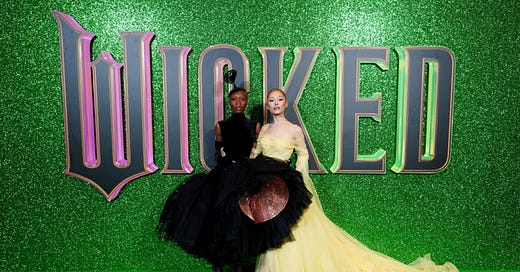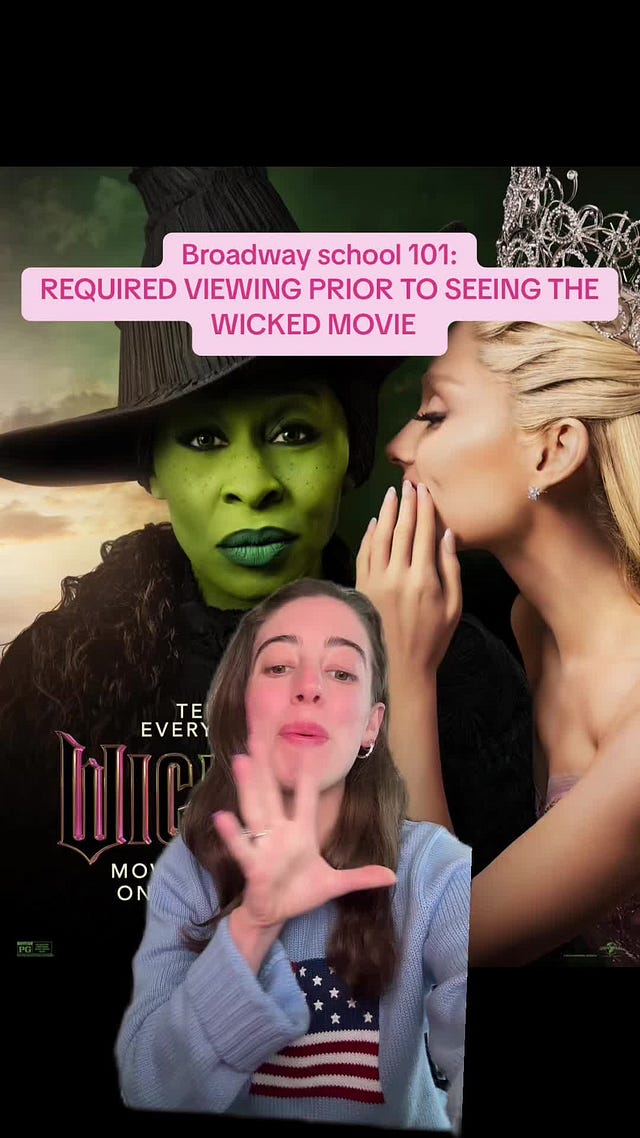How Wicked Forecasted The Western Skies
So, here’s the breakdown – the cultural phenomenon of Wicked is here.
Like what you read? Liking posts on Substack, sharing, and subscribing are all much appreciated ways to support the work of Words From My Wits’ End. Talk soon<3
Warning: Wicked spoilers ahead!
I hope you’ve been holding space for the lyrics of “Defying Gravity” this week. By now, I’m sure everyone has seen that interview clip, finger hold and all. Viewers unfamiliar with the Wicked game cannot seem to stop talking about the deeply emotional and frequently teary press tour interviews surrounding the film, but it all makes sense after seeing the film on its opening weekend.
Cynthia Erivo added new depth to the role of Elphaba Thropp through her own Black identity, while Ariana Grande traded in her pop star prowess for a traditional broadway diva in her role as Galinda (who changes her name to Glinda, in true queen bee fashion). The pair evoke a deeply emotional platonic chemistry onscreen and off, making their dynamic incredibly endearing. After their respective illustrious Broadway careers, both women additionally delivered captivating vocal performances, as did the rest of the supporting cast (namely, Jonathan Bailey’s swaggering Fiyero).
Wicked is loosely based on the novel of the same name by Gregory Maguire, and offers a revisionist history of L. Frank Baum’s The Wizard of Oz, once adapted as one of the world’s earliest color films. The musical takes the concepts of good and evil under a microscope, and paints a brutally truthful tale of the human condition through witches, munchkins, and talking animals in a surrealist universe.
Elphaba Thropp is ostracized for her green skin throughout her life, and struggles with her own dysfunctional family, namely, her father’s resentment. Glinda, on the other hand, is all pink tulle, popularity, and good deeds. Elphaba emerges as the more powerful between the two, with her powers growing each time she becomes angered by injustice. Her professor at Shiz University, Madame Morrible (Michelle Yeoh in a whimsical wig) delivers one line in the film that sets the tone for the story, and also anchors it in the viewer’s reality – “once you learn to harness your emotions, the sky’s the limit.”
After being raised by a harshly critical father and even more critical peers, Elphaba begins to internalize her rage at injustice. Through her unlikely friendship with Glinda, she feels safe, supported, and loved for the first time. This prompts her to recognize that everyone deserves such security, and largely propels her fight for justice when Oz’s animals are silenced and disenfranchised.
When Morrible emerges as a conniving political villain hoping to use Elphaba as the very human wizard’s (Jeff Goldblum) weapon against the talking animals, Elphaba certainly harnesses her emotions. However, she does not do so in the way Morrible intended. Instead of internalizing her emotions, Elphaba actualizes them, and walks away from her dream job upon learning it is unethical. The wizard uses fear and uncertainty to manipulate the masses and keep up the illusion about his power. Glinda, however, cannot bear to follow Elphaba to the west, fearing losing her family, boyfriend, and all that she has worked for.
 Tiktok failed to load.
Tiktok failed to load.Enable 3rd party cookies or use another browser
Wicked part one’s thunderous closing number raises the question of just how good Glinda is. It is clear that Elphaba was never truly the Wicked Witch of the West. Glinda is never meaner than a petty school girl at worst, and shows genuine friendship to Elphaba and her sister Nessarose, who lives with a disability. She clearly cares deeply for Elphaba and respects her choice to become a political activist, even if it makes her an outlaw. But why can’t she bear to part with her life, to make the same selfless sacrifice as Elphaba, and to truly put others ahead of herself?
Such is the moral discussion at the heart of Wicked, and likely why its leads have felt so emotional leading up to its widespread theatrical release. The film began shooting on an intricately crafted set in England in 2022, with shooting cut short for the joint SAG-AFTRA and WGA strike, which impacted the production’s American actors. This timeline in mind, Erivo and Grande were locked into the world of Wicked for potentially longer than two years.
When they emerged from the bubble, they embarked on the bustle of a busy release schedule, premieres, and a press tour heard around the world. After working to tell the story of one marginalized woman’s power in finding her voice and allowing her emotions to guide her in her crusade to free the disenfranchised, they came back down to earth in what is soon to be round two of Trump’s America.
It’s worth noting that composer Stephen Schwartz wrote Wicked’s musical numbers with his own heritage in mind. People of color and Jewish people are undeniably represented in Elphaba, a character that uses her uniqueness to find power within herself and help others feel seen. In an environment that now casts a darkness over these communities, it feels like Wicked came at just the right moment.
Beneath its technicolor whimsy and vocally ambitious musical numbers, Wicked is, at its core, a deeply political underdog story. The politics of a friendship between people like Glinda and Elphaba leads the viewer to look inward, as it is a dynamic that many experience everyday. As women’s reproductive rights were stripped by a largely Trump-appointed Supreme Court that struck down 1973’s Roe v. Wade, thousands of American women continue to grapple with the candidate their coworkers, significant others, friends, and family voted for.
Wicked narrows in on the harrowing notion that sometimes, even good people are not willing to make sacrifices to battle greater evils or threats to marginalized people. Glinda is not a villain – in many ways, she is a devoted friend who enjoys helping people with their everyday struggles. But does her inability to follow Elphaba make her a rebel without a cause?
Experiencing such a deeply real yet fantastical story in such an insular setting only to be exposed to similar patterns in reality must be jarring. In the 21 years since it began its Broadway run, the play’s political advocacy messaging is often still lost beneath its intricate costumes and references to the uncanny Wizard of Oz. If “holding space” and finger-holding is getting women through hard times, then so be it. Everyone gets to defy gravity in their own ways amid these uncertain western skies.





